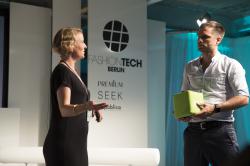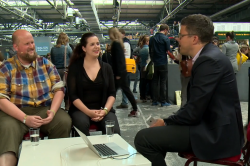annalee_2.png

If we knew that the world was going to end tomorrow, would we still be starting new blogs today? The glaciers are merrily melting away, rising sea levels are splashing at our feet and global environmental pollution is taking on an ever greater magnitude. It looks like the planet is heading to its final end in a fast car. And if climate change doesn’t take us all out then, obviously, it’ll be the zombie apocalypse that does it!
Science-journalist and author Annalee Newitz delivers a healthy dose of optimism to counter this felt existential threat. As editor-in-chief of io9 , she normally works in the spectrum of pop, sci-fi, and nerd culture which leads us on to some utopian visions. In her most recent book "SCATTER, ADAPT AND REMEMBER - How Humans Will Survive a Mass Extinction", Newitz researches the various end-of-the-world scenarios of the different eras.
„Fundamentally, we are a species of builders and explorers. We've survived this long by taking control of our destiny. If we want to survive the next mass extinction, we can't forget how we got here.“
Annalee Newitz is not scared of global annihilation. She doesn't root for team Armageddon and instead is more interested in survival strategies and out-of-the-box ingenuity. At re:publica, she'll immunise her audience against apocalyptic fear-mongering and naysayers. The future remains wild and unwritten - if we really want it to be.
Annalee Newitz studied at Berkeley, California, was a Knight Science Journalism Fellow at MIT and worked as a political advisor for the Electronic Frontier Foundation (EFF). Her blog “io9” has become one of the most popular science and sci-fi blogs on the web and is dedicated to science-fiction, technology and pretty much everything else that the future holds for us.
 Das Wissenschaftsjahr 2014 – Die digitale Gesellschaft
Das Wissenschaftsjahr 2014 – Die digitale Gesellschaft
The digital society is a society in change. Digital technologies permeate our daily lives and offer a variety of new possibilities. The Year of Science 2014 – the digital society shows how science and research drives these developments and dedicates itself to the outcomes of the digital revolution.
www.digital-ist.de
Foto by Jonathan Wilkins



